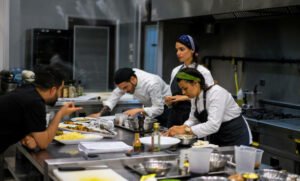Culinary School Grants 2024 – Unlock Your Culinary Dreams.

Have you been aspiring to discover opportunities with culinary school grants? Explore a world of possibilities with culinary school grants. Find financial support to pursue your passion and turn your culinary dreams into reality. Learn more about available grants and how they can shape your culinary education journey.
Culinary school grants are financial aids specifically designed to support individuals pursuing education in culinary arts. These grants can help cover tuition, fees, and other related expenses for aspiring chefs and culinary enthusiasts. They are awarded based on various criteria, including merit, financial need, and sometimes specific qualifications or affiliations. Culinary school grants aim to make culinary education more accessible and allow passionate individuals to pursue their culinary dreams without overwhelming financial burdens.
Types of Culinary School Grants
Various culinary school scholarships employ different criteria for assessing applicants. Merit-based ones consider academic achievement and culinary skills, while need-based scholarships target lower-income students. Certain scholarships are linked to culinary competition participation, and others are exclusive to individuals meeting specific personal criteria, such as military service, single parenthood, ethnicity, and residency.
Merit-Based Culinary School Scholarships
Begin your quest for merit-based culinary scholarships by exploring offerings from these providers.
Since its establishment in 1991, the James Beard Foundation has been a pivotal force in culinary arts, leaving an enduring legacy. Over the years, it has awarded more than $8 million in culinary school scholarships and financial aid to over 2,000 students. The foundation supports aspiring individuals through three distinct avenues:
1. Friends of James Beard: Cash grants directly applied to tuition and related school expenses.
2. James Beard School Scholarships: Tuition waivers offered by culinary schools.
3. Grants for Working Culinary Professionals: Financial assistance for culinary industry professionals to enhance their education through experiential learning at farms, fisheries, wineries, and other food production venues.
2. National Restaurant Association Education Foundation Scholarships (NRAEF)
Established in 1987, the National Restaurant Association stands as an advocate for individuals across diverse backgrounds seeking to cultivate career-ready skills in the restaurant and food services industry. With a commitment to fostering a thriving hospitality sector in America, the association has provided $23 million in financial aid to individuals at various stages of their careers, spanning youth to adults.
Within its offerings, the association provides numerous programs and scholarship opportunities tailored for students pursuing culinary education.
- Direct NRAEF Scholarships
The NRAEF grants $2,500 in general scholarships to chosen students who, for the upcoming academic year, are enrolled full-time or part-time in an accredited culinary school, college, or university. Eligible students must pursue an associate or bachelor’s degree in the restaurant, food service, or hospitality fields.
- Named NRAEF Scholarships
NRAEF collaborates with private firms to provide extra scholarships known as Named Scholarships, often granted in the name of individuals or businesses. For instance, Distinguished Restaurants of North America (DiRoNA) offers a scholarship for fine dining enthusiasts, and the SPB Foundation has an award for those aspiring to careers in craft breweries or brewery restaurants. The application process for these named scholarships mirrors that of the Direct NRAEF Scholarships.
ProStart is a high school program spanning two years, designed for students eager to kickstart their culinary careers. The program offers hands-on experience and develops practical skills. Those who achieve the ProStart Certificate of Achievement may qualify for scholarships and college credit at specific culinary schools. Additionally, participants have the opportunity to compete in the National ProStart Invitational for a chance to earn further scholarships.
4. State Restaurant Association Scholarships
Every state has its own restaurant group connected to the National Restaurant Association. Numerous state groups provide culinary school scholarships specifically for in-state residents. Verify with your state’s chapter to explore eligible scholarships for you.
5. American Culinary Federation Education Foundation Scholarship
The American Culinary Federation (ACF) has played a pivotal role in transforming chefs’ status in the U.S. from lower-level service positions to esteemed professionals. Recognized for its high training standards, ACF holds a prestigious reputation in the culinary arts.
ACF’s scholarships, reaching up to $1,500 for certificate program students and up to $2,500 for those in post-secondary degree programs, aim to support thousands of aspiring professionals in the hospitality industry, ensuring they receive top-notch education.

6. The Vegetarian Resource Group College Scholarship
The Vegetarian Resource Group, a nonprofit dedicated to promoting the vegetarian and vegan lifestyle, annually awards scholarships to high school seniors. With one $10,000 scholarship and two $5,000 scholarships, it’s a great opportunity for those committed to a vegetarian or vegan diet. Although not exclusive to culinary students, many past winners pursuing plant-based culinary arts have utilized this merit-based scholarship, sharing aspirations of opening their own plant-based restaurants.
7. The Trotter Project Homaro Cantu Scholarship
The Trotter Project, committed to sustainable agriculture, culinary education, and alleviating food insecurity, has distributed nearly $265,000 in 38 scholarships as of October 2021.
The Homaro Cantu Scholarship, a $10,000 award, acknowledges exceptional students in culinary arts or hospitality management. To apply, students need to submit their GPA, letters of recommendation, and a video showcasing their passion for the culinary arts and long-term goals.
Need-Based Culinary Scholarships
Scholarships based on financial need consider a student’s economic circumstances, aiming to provide access to education for those with lower incomes who might otherwise face barriers.
- School-Specific Culinary Scholarships
Numerous culinary schools provide scholarships to enrolled students showcasing financial need, including dedicated culinary schools and community college programs.
The Escoffier Scholarship Foundation annually raises funds to support students in need at the Auguste Escoffier School of Culinary Arts. Eligible applicants must demonstrate financial need through required Financial Aid documents, submit a brief application essay, and maintain a 2.0 GPA, with applications aligning with Escoffier’s term start dates.
2. Food Dreams Scholarship
Food Dreams, a nonprofit situated in New York, is dedicated to facilitating culinary education and mentorship for financially disadvantaged students. The scholarship, open to high school or international school graduates in need, offers varying award amounts depending on the chosen school and program. Successful candidates undertake a year-long apprenticeship at one of Chef Jean-Georges Vongerichten’s restaurants upon completing their education. Applications are accepted throughout the year.
3. The Trotter Project Pursuit of Excellence Scholarship.
Apart from the Homaro Cantu Scholarship, The Trotter Project provides the Pursuit of Excellence Scholarship, a need-based award of up to $10,000. This scholarship is open to nontraditional or current culinary arts students facing financial challenges. Although The Trotter Project doesn’t explicitly define “nontraditional student,” the National Center for Education Statistics considers those over the age of 24 as nontraditional.
Competition-Based Culinary Scholarships
Culinary scholarships based on competition are given to individuals who participate in and/or emerge victorious in food-based contests. These scholarships can be granted either directly by the competition hosts or earned through students’ participation, leading to scholarships directly from their school.
- National ProStart Invitational
The National ProStart Invitational is organized by the National Restaurant Association’s ProStart® program and features culinary arts and restaurant management competitions for high school students. In the culinary arts contest, teams must craft a three-course meal in under an hour without access to running water or electricity. The restaurant management competition requires students to pitch their distinct restaurant concept to the judges.
Participants in the ProStart Invitational® receive a $500 scholarship from Escoffier, and winners have the opportunity to earn additional Escoffier scholarships ranging from $1,500 to $7,000 (not applicable to online programs).
2. Family Career Community Leadership of America
Family Career Community Leadership of America (formerly Future Homemakers of America) empowers young individuals to develop leadership skills focused on career and family. This high school program organizes Students Taking Action with Recognition (STAR) competitions, allowing students to demonstrate their expertise in culinary arts and baking. Local champions progress to regional and national events.
All FCCLA competition participants are entitled to a $500 Escoffier scholarship. Additionally, winners at local, regional, and national levels may qualify for scholarships of up to $7,000, contingent on the competition level and their placement (excluding online learning programs).
3. SkillsUSA
SkillsUSA collaborates with high school and college students, teachers, and industry leaders to ensure the nation maintains a skilled workforce. Partnering with over 650 businesses and trade associations, they bring skilled education beyond the classroom and into the real world.
The SkillsUSA Championships cover numerous categories, including culinary arts and commercial baking. The culinary competition challenges students to craft a four-course meal over a full day while baking competitors create bread, rolls, cookies, pies, and decorated cakes.
All participants are eligible for a $500 scholarship from Escoffier. Additionally, first, second, and third-place winners may receive awards ranging from $1,500 to $7,000 from Escoffier (excluding online learning programs).
4. Careers Through Culinary Arts Program (C-CAP)
C-CAP, a regional culinary nonprofit, collaborates with high schools in Los Angeles, Arizona, Chicago, Newark/Camden, Washington, DC, New York, and Philadelphia. Their cooking competitions task students with creating classic French dishes in a timed setting. Victorious participants have the opportunity to earn scholarships for their college or culinary school preferences.
Personal Circumstance and Location-Specific Culinary Scholarships
Apart from the broad, widely accessible scholarships, there exists an extensive array of scholarships tailored for specific groups of students. These scholarships cater to a more limited pool of applicants, resulting in lower competition for eligibility.
Veteran and Military Scholarships
Escoffier extends a Student Veteran Scholarship to those applying and qualifying for Veterans Benefits from a U.S. Armed Forces branch. Eligibility doesn’t require completion of the Free Application for Federal Student Aid (FAFSA). This scholarship exclusively covers direct institutional expenses, such as tuition and fees. An institutional scholarship spans various categories under one application. While these scholarships in the category can be awarded together, students must not exceed the overall scholarship maximum of $7,500 in a diploma program or $15,000 in an Associate Degree program at physical campuses.
For online programs, scholarship awards include up to $1,000 for active military and veterans, with children/spouses of veterans eligible for awards up to $500.
Veterans and active-duty military members can access various scholarships and financial aid options. The Post-9/11 GI Bill provides up to 100% coverage for tuition, fees, housing, and textbooks/supplies for a duration of 36 months for active duty military or honorably discharged veterans.
Escoffier proudly participates in the Yellow Ribbon Program.
Location-Specific Scholarships.
Certain scholarships are exclusively available to students residing and attending school in specific states, counties, or cities. Take the Frans Hagen Scholarship, for instance, which is accessible to high school students, college students, and current industry employees in Washington, DC, pursuing a culinary education.
Explore scholarships tailored for residents of your city, county, or state. Initiating your search with the state restaurant association and local chamber of commerce can be a beneficial starting point.
Demographic-Based Scholarships
Additional scholarships are available to individuals meeting specific demographic criteria to address historical underrepresentation. Examples include scholarships for Black or Latinx students provided by organizations like the United Negro College Fund or the Hispanic Scholarship Fund.
Specialized scholarships cater to women, members of the LGBTQ+ community, and those facing particular life circumstances, such as The Soroptimist Live Your Dreams Awards for single mothers. Escoffier also extends support with the Single Parent Grant.
Employer-Based Scholarships
Certain employers administer internal scholarship programs. If you are employed in a restaurant or another food-service establishment, inquire with your managers about potential scholarship opportunities within the company.

READ ALSO: College Grants for Living Expenses 2024 – A Comprehensive Guide
Required documents for Culinary School Grants
1. Proof of Enrollment:
Provide official documentation confirming your enrollment or acceptance into a culinary program.
2. Academic Transcripts:
Include transcripts from your previous educational institutions, showcasing your academic performance.
3. Letters of Recommendation:
Submit letters from teachers, mentors, or professionals who can attest to your commitment and capabilities in culinary arts.
4. Personal Statement:
Write a personal statement outlining your passion for culinary arts, career goals, and why you deserve the grant.
5. Resume or Curriculum Vitae (CV):
Include a comprehensive resume or CV detailing your relevant education, work experience, and achievements in the culinary field.
6. Financial Aid Application Form:
If required, complete the financial aid application form provided by the culinary school or grant provider.
7. Income and Financial Documents:
Submit documents such as tax returns, W-2 forms, or other financial records to demonstrate your financial need.
8. Proof of Citizenship or Residency:
Provide documentation proving your citizenship or residency status, as some grants may have eligibility criteria related to this.
9. Portfolio (if applicable):
If applicable, create a portfolio showcasing your culinary work, including photos, recipes, or any relevant projects.
10. Essay or Responses to Prompts:
Address any specific essay prompts or questions posed by the grant application, expressing your unique perspective and goals.
11. Proof of Military Service (if applicable):
If you are a veteran applying for military-related grants, include documentation confirming your military service.
12. Additional Certifications or Training:
Include copies of any relevant certifications or training you have received in the culinary field.
13. FAFSA or Financial Aid Information:
If required, provide information from your Free Application for Federal Student Aid (FAFSA) to demonstrate financial need.
14. Valid ID or Driver’s License:
Include a copy of a valid identification or driver’s license as part of your application.
15. Proof of Unique Circumstances (if applicable):
If you are applying for grants related to unique circumstances, such as being a single parent, provide relevant documentation supporting your situation.
16. Legal Guardianship Documents (if applicable):
If you are a dependent and applying independently, provide legal guardianship documents if applicable.
17. Language Proficiency Tests (if applicable):
If your culinary program is in a language other than your native language, include language proficiency test scores.
18. Proof of Membership or Affiliation (if applicable):
If the grant requires membership in a specific organization, include proof of your affiliation.
19. Social Security Number (if applicable):
Some applications may require your Social Security Number; ensure you provide it where necessary.
20. Any Other Specific Documentation:
Check the grant application guidelines for any additional documents required, as requirements may vary.
General eligibility criteria for culinary school grants.
1. Enrollment in Culinary Program:
Typically, applicants must be enrolled or accepted into a recognized culinary program.
2. Academic Performance:
Some grants consider academic achievements requiring a certain GPA or academic standing.
3. Financial Need:
Many culinary school grants are need-based, considering the applicant’s financial situation.
4. Specific Demographic Criteria:
Certain grants may have specific eligibility criteria based on demographics, such as gender, ethnicity, or veteran status.
5. Participation in Culinary Competitions or Programs:
Some grants may require participation in culinary competitions or specific programs.
6. Career Goals in Culinary Arts:
Applicants may need to demonstrate a clear commitment to pursuing a career in the culinary arts.
7. Membership in Culinary Organizations:
Membership in culinary organizations or associations may be a requirement for some grants.
8. Community Involvement:
Grants might consider community involvement or volunteer work related to the culinary field.
9. Demonstrated Passion for Culinary Arts:
Applicants may need to showcase their genuine passion for culinary arts through essays, interviews, or portfolios.
10. Recommendation Letters:
Letters of recommendation from teachers, mentors, or culinary professionals may be required.
11. Unique Circumstances:
Some grants target individuals facing unique circumstances, such as being a single parent or overcoming significant challenges.
12. Citizenship or Residency Status:
Specific grants may have eligibility criteria based on citizenship or residency status.
13. Military Service (for Veteran Grants):
Grants for veterans may require proof of military service or honorable discharge.
14. Online Program Eligibility:
Eligibility criteria may vary for online culinary programs, and some grants may be specific to on-campus programs.
15. Age or Educational Level:
Some grants may have age restrictions or specific educational levels as eligibility criteria.
16. Minimum Course Load:
Certain grants may require applicants to maintain a minimum course load or specific program requirements.
17. Employment in Culinary Industry:
Employment or work experience in the culinary industry might be a criterion for certain grants.
18. Demonstrated Financial Independence (for Independent Applicants):
Independent applicants may need to demonstrate financial independence from parents or guardians.
19. Adherence to Application Guidelines:
Applicants must adhere to the specific guidelines outlined by the grant provider.
20. Legal Compliance:
Compliance with all legal requirements, such as having a valid Social Security Number, may be necessary for eligibility.

Frequently asked questions on Culinary School Grants.
1. How can I find culinary school grants?
You can find culinary school grants by checking with your chosen culinary school’s financial aid office or exploring external scholarship programs related to culinary education.
2. What types of grants are available for culinary schools?
Culinary school grants come in various forms, including need-based, merit-based, and program-specific grants.
3. Are there grants specifically for online culinary programs?
Yes, there are culinary school grants available for online programs, but eligibility criteria may vary.
4. Can international students apply for culinary school grants?
Some culinary school grants may be open to international students; however, it’s essential to check the specific requirements of each grant.
5. What are the eligibility criteria for culinary school grants?
Eligibility for culinary school grants is typically based on factors like financial need, academic achievement, and specific criteria set by the grant provider.
6. Are there grants for part-time culinary school students?
Culinary school grants may be available for part-time students, but requirements might differ from full-time programs.
7. What expenses do culinary school grants typically cover?
Culinary school grants often cover tuition, and some may include allowances for supplies, books, or other related expenses.
8. Are there grants for specific culinary disciplines like baking or restaurant management?
Explore specialized culinary school grants for disciplines like baking, culinary arts, or restaurant management through dedicated scholarship programs.
9. Do culinary schools offer grants for non-traditional students?
Yes, there are culinary school grants designed for non-traditional students, such as those entering culinary school later in life.
10. Can I apply for multiple culinary school grants simultaneously?
It’s possible to apply for multiple culinary school grants simultaneously, but be sure to check each grant’s guidelines.
Conclusion
Culinary school grants play a pivotal role in providing financial support for aspiring chefs and culinary enthusiasts. As we’ve explored the diverse landscape of these grants, it becomes evident that eligibility criteria vary widely. From academic achievements and financial need to specific demographic considerations, the requirements are designed to create a fair and inclusive selection process.
Understanding the eligibility criteria is crucial for prospective applicants, as it ensures a targeted and strategic approach to securing these valuable resources. Whether pursuing a traditional culinary education, an online program, or facing unique life circumstances, there are grants available to support diverse paths in the culinary arts.
As culinary schools, organizations, and businesses continue to invest in the future of the culinary industry through these grants, individuals are encouraged to explore the myriad opportunities available. By navigating the eligibility requirements with diligence and presenting a compelling case for their passion and commitment to the culinary arts, aspiring chefs can embark on a journey toward achieving their educational and professional goals.


